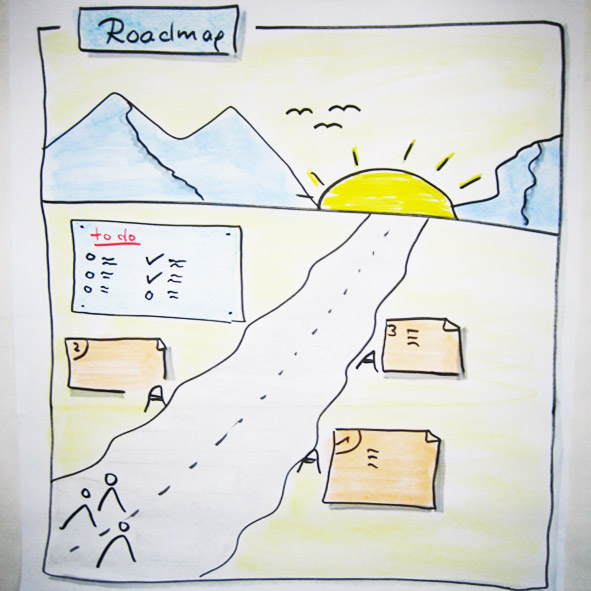In order to meet the demands of the market in the long term, it is necessary to question the previous procedures, techniques, processes or tools at regular intervals and to adapt them if necessary. Planned and structured change management is the basic prerequisite for the successful development of an organization.

An agile approach is also suitable for the transformation of methods, processes or tools (PMT for short). In sprints, selected PMT items from a previously defined PMT backlog are tested again and again over the defined sprint period and evaluated in the retrospective at the end of each sprint. Each PMT item that is evaluated positively is to be reused in the future. All other PMT items are no longer used. Thus, the existing procedure is positively changed in short cycles. There is no one-time major complete change, but a continuous improvement and change process.
Setting up a functioning (agile) change management is a normal project: First, the transformation must be structured sensibly by means of planning, a project team must be selected, general conditions must be determined, realistic and measurable goals must be agreed upon, and concrete work packages, such as a marketing, training, coaching, piloting, and possibly migration concept, must be defined. The project team must be representative of the various groups affected in the organization and have a positive attitude toward the project. In this way, they will later contribute to the positive dissemination and multiplication of the information. Before the implementation of the transformation can begin, the project team must define a change management process or structure.
During the implementation of the transformation, it is advisable to document the findings, such as the course of the project, difficulties, countermeasures and results, in order to be able to use them as best practices for subsequent projects and to readjust the current project.


In many projects, those who are most affected by a transformation are unfortunately informed about the planned change far too late. Yet it is precisely by passing on information at an early stage that reservations and fears among the people affected can be reduced. In addition, advertising the planned change leads to motivation, which makes the people concerned curious and can convince them. When creating the marketing strategy, it is important to think about the target groups and their information needs beforehand. Thus, depending on the target group in an organization, several different marketing measures may also prove useful.
Deep within every human being there is the need for security, which is generated by, among other things, known methods, systems and environments. Changes are therefore something unknown, which can disturb the need for security and trigger fears and resistance. In order to reduce fears and resistance, the concept of knowledge transfer should therefore not be underestimated when introducing something new as part of change management. The increase in knowledge is divided into two different types of knowledge, most of which build on each other. On the one hand the declarative knowledge, i.e. the knowledge about a fact, and on the other hand the procedural knowledge, i.e. the ability to apply the knowledge. Carefully planned, prepared and implemented training and coaching concepts, as well as comprehensibly documented guidelines, are usually an important basis for the implementation of an introduction.


Pilot projects are a good way to try out new PMTs in a real environment. Changes can be tested on a small scale before they are rolled out to the entire company. In this way, the changes can be put through their paces and, if necessary, adapted. Not every project is suitable as a pilot project. Before selecting a pilot project, you should therefore establish your own criteria for selecting a project. Only a project that meets as many of these criteria as possible is suitable.
Particularly in the case of change management of PMTs, it is important to think about a migration concept beforehand, since a loss of data or even the conversion of a procedure in a critical project can lead to problems. Within the framework of a migration concept, it is important to clarify which data must be migrated or archived from a tool, for example, or whether a new method should only be used in a newly starting project or also in projects that are already running. By means of different migration stages, conversions can be carried out step by step in order to avoid an immediate complete conversion.

If you have any questions to the consulting and project work of SOPHIST, we are at your disposal: from the organization and preparation to implementation and follow-up. We will be happy to help you.
Copyright 2018
Do you need more information?
Just give us a Call and let us direct you to the right contact person?
Tel: +49 (0)9 11 40 90 00
E-Mail: heureka[at]sophist[dot]de
Our office hours: Monday to Thursday: Friday:
08:00 - 12:00 Uhr 08:00 - 12:00 Uhr
13:00 - 18:00 Uhr 13:00 - 17:00 Uhr
Of course you are also welcome to reach various departments directly by e-mail:
All about trainings, projects or consulting activities:
All about our job offers and your career opportunities at SOPHIST:
DeineZukunft[at]sophist[dot]de
All about our events, marketing activities and publications:
You might also be interested in these topics: